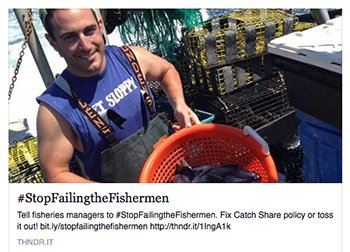Catch share programs have been heralded in all corners of the country, first by NGOs and second by some of the fleet owners, fishermen and processors to whom they have brought success.
 NAMA's social media campaign urges fishing community supporters to sign the petition and use the hashtag #StopFailingtheFishermen. Facebook photoThe counterbalance to those claims of success are of course the thousands of voices of fishermen and many more thousands of supporting small businesses put out of work as a result of catch share programs. But even worse, at least one catch share program was implemented with such haste that it may actually be damaging the ecosystem it was prescribed to save.
NAMA's social media campaign urges fishing community supporters to sign the petition and use the hashtag #StopFailingtheFishermen. Facebook photoThe counterbalance to those claims of success are of course the thousands of voices of fishermen and many more thousands of supporting small businesses put out of work as a result of catch share programs. But even worse, at least one catch share program was implemented with such haste that it may actually be damaging the ecosystem it was prescribed to save.
Enter: New England groundfish. In a press release yesterday, Northwest Atlantic Marine Alliance Community Organizer Brett Tolley stated, “In the five years since the catch share policy was implemented in New England, fishing rights have dramatically consolidated, community based fishermen have less access to fishing quota, and pressure on inshore fishing areas has increased.”
“For many fishermen, this means a loss of our livelihood and culture. It means a break in a family tradition. And perhaps more importantly, it means future generations in these fishing families will have no access to using and stewarding the fish stocks and marine ecosystems that have sustained them for so long,” said fisherman Tim Rider of Saco, Maine.
If an entire region of the country is struggling after going far above and beyond to protect their resource, then we have to consider that what we’re doing to manage the resource is not effective.
No single management system will have a 100 percent success rate. Of course we should strive for that. But regardless of what happens to the New England codfish, we can say without a doubt that we did everything we could to protect that species and bring it back to no avail.
What we don’t know is what’s hurting us.
What we do know, we’re not acting on, and that’s hurting us, too.
Flexibility in Magnuson is the only way to give some New England and Southern fisheries a whisper of hope. The fishermen in these regions need legislation to push their councils to take a holistic look at fishing communities and ecosystems. How can we refuse to offer a helping hand to fellow fishermen?
They don’t want help in the form of disaster money or handouts in the form of buybacks or buyouts. What they want is to be given a chance to try something new with their fishery.
In the meantime, we should be putting more effort into gear innovations and data on these fisheries and more money into marketing underutilized species like dogfish. Instead we keep leaning harder and harder on the fishermen to maintain an ineffective status quo.
As Tolley points out, stewards of the resource have made appeals and suggestions to improve the New England program. But the council has turned a blind eye to the system’s flaws, which they promised at the outset to fix because they recognized five years ago that the program was shoved through in haste and was likely to be a disaster in the making.
We still have a disaster. We still have a broken system. The question is how long we will still have a fishery?







